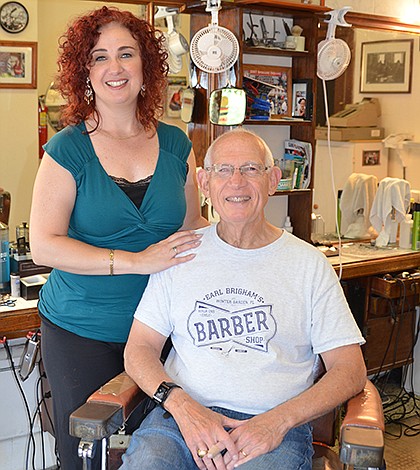- April 19, 2024
-
-
Loading

Loading

WINDERMERE — Mandy David has known American Sign Language for as long as she can remember. She and her six brothers and sisters needed to learn it if they were to have a close relationship with their father, Earl Brigham, who has been deaf since he was a toddler.
They are all close with Brigham, who is nearly 70 and has operated his barbershop in downtown Winter Garden for 39 years.
Growing up in a household where sign language was as common as the spoken word had such an impact on David that she has devoted her life to assisting those in the deaf community. She started as a professional interpreter, helping a deaf college student in the classroom for one-and-one-half years.
“I fell in love with it,” she said. “It’s a passion of mine to make sure the deaf have effective communication.”
She then worked with a few agencies in Central Florida, but she was disappointed in the quality of the service provided
So she started her own.
Five years ago, she created JFD Communications, a company that provides communication for deaf and hard-of-hearing individuals. David said people call JFD when they need a certified interpreter for occasions such as a job interview, doctor’s appointment or class. Her company also can provide captioning for videotaped speeches or instructional lessons.
LIFE WITH EARL
Earl Brigham was born in Panama with the ability to hear, David said. He was just grasping the Spanish language when, at age 3, he suddenly lost his hearing. It never returned, but he learned to communicate by reading lips and writing notes and with sign language.
To this day, he keeps a notepad and pen nearby in his barbershop to help him communicate with his hearing customers.
David, who grew up in Pine Hills, remembers as a child accompanying her father when he worked downtown with longtime barber Ed Reeves. She occasionally interpreted for him when the other person had a beard or mustache, which sometimes makes it difficult for her dad to read lips, she said.
Brigham still can speak a few Spanish words from his childhood such as “madre” (mother), “padre” (father) and “abuela” (grandmother), but that is all, David said.
However, he doesn’t let his disability hinder him in communicating and, in fact, he has shared his Christian faith for years. He has served as a deaf pastor at First Baptist Church of Pine Hills (now First Baptist of Central Florida) and currently leads a deaf Sunday school and preaches sermons at West Orlando Baptist Church in Winter Garden.
David remembers him taking a group of children to a deaf camp each year at Bill Rice Ranch in Tennessee.
LIFE AS AN INTERPRETER
As a teenager, David worked with the deaf children at church and taught a deaf Sunday school class. After she married, she was an interpreter at First Baptist Church Orlando.
Today, she interprets at First Baptist Church of Winter Garden when there is a need during sermons and Wednesday night Bible study.
“I love when the deaf person is getting it, that they trust you and feel comfortable using you as an interpreter,” David said. “I want that rapport with the deaf client.”
So when a deaf person makes a request, she works to accommodate him or her. When interpreting, especially in front of a crowd, she has learned the importance of wearing a solid shirt, having been told by deaf people that patterns and multiple colors are too distracting.
“He is the reason I do it,” David said of her father. “I want him to know what’s going on. I want (deaf people) to have the same opportunities and privileges.”
David likes to have fun with her sign-language skills and once provided interpreters for a performance of “The Wiz” with People’s Theatre in Orlando. They were matched up one-on-one with all of the characters; she was Dorothy.
“I can’t just stand there and interpret,” she said. “I have to get into character.”
Equally enjoyable is interpreting at comedy shows — or trying to interpret, as was the case at one show when the comedian ad-libbed and spoke so fast that she had to throw her hands up and take a breath. The audience laughed anyway.
“The deaf miss out on a lot more because some things (like puns) don’t translate well,” David said. “In the English language, inflection is everything. For the deaf, it’s even harder.”
For more information about JFD Communications, visit jfdcommunications.com.
—
Here are some tips on how to best communicate with someone who is deaf.
• Talk directly to them even when you are using the interpreter. The interpreter is just a means for communication between you and the deaf person.
• Eye contact is important and lets the deaf person know you are paying attention.
• Treat them as you would other people. They are not contagious; they just can’t hear.
• Don’t ignore them. They don’t want to be left alone too long just because you can’t communicate with them.
• Deaf people can tend to be blunt sometimes. Just be patient with them.
• Some deaf tend to take things literally. You need to make sure you explain what you are saying clearly. This is best done with an American Sign Language interpreter.
Source: JFD Communications
—
Contact Amy Quesinberry Rhode at [email protected].